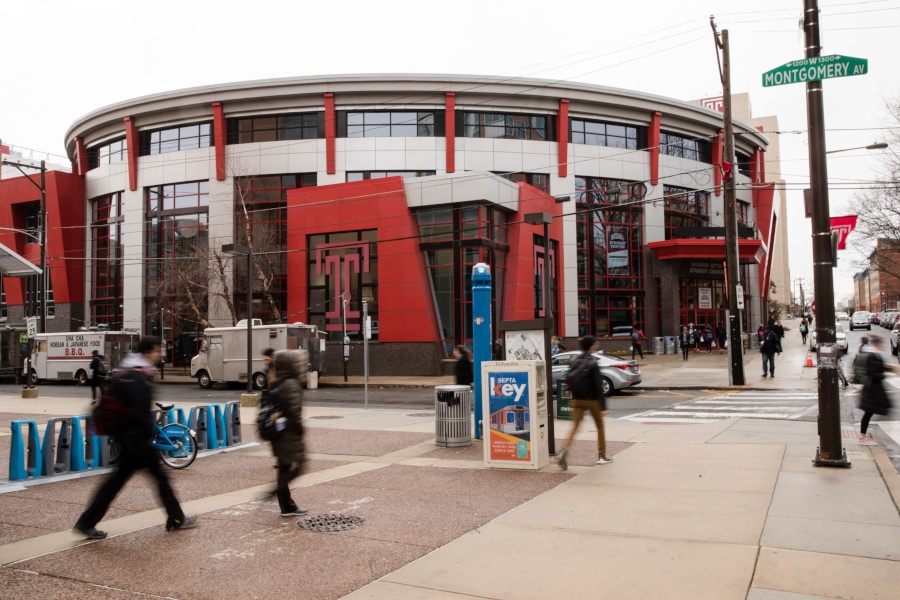Outdoor Smoking Bans Are Spreading — and Useless
Total bans on lighting up alfresco are popping up everywhere from the Jersey Shore to Temple University — but what’s the point if they’re never enforced?

Temple University’s main campus in North Philadelphia | (AP Photo/Matt Rourke)
Let’s get one thing out of the way: Smoking kills you. It’s the leading cause of preventable death in the United States, and every year half a million Americans die from smoking-related diseases.
But even with all those deaths, smoking remains legal. Should it be? Maybe not. But for now it is — yet despite its continued legality, it’s becoming harder and harder, if you are a smoker, to actually find a place where you’re allowed to light up. Indeed, total outdoor smoking bans are proliferating, from Jersey Shore beaches and Philly public parks to college campuses. Most recently, Temple University unveiled its own new smoking ban, which went into effect on July 1st.
There’s something fundamentally jarring about policing public spaces in this way, especially in urban environments that are rife with constant petty annoyances. (South Philly trash heaps, anyone?) Anti-smoking advocates will invariably cite secondhand smoke as the primary reason for instituting outdoor smoking bans — and for good reason: Secondhand smoke is a cause in 40,000 deaths annually. That’s a real concern, but is outdoor smoking as critical an issue as, say, smoking in cars with young children in them? As of 2017, only eight states regulated that, and Pennsylvania and New Jersey weren’t — and still aren’t — among them. Or perhaps, say, smoking within apartment complexes, which the Centers for Disease Control says is a frequent source of smoke exposure even in non-smoking households?
Outdoor smoking is the easier target simply because it’s more visible than its insidious counterparts, but its effects are not widespread — one study found that once a person gets six feet away from a smoker, hazardous inhalation levels dissipate. Other researchers have cast doubt on the link between secondhand smoke and lung cancer. There simply isn’t strong scientific consensus, particularly regarding the danger of outdoor secondhand smoke, apart from what we know about the six-foot barrier. Why, then, couldn’t Temple and the other universities with smoking bans — some 2,000 total institutions, including Penn and the University of the Sciences — simply erect designated outdoor smoking areas, like Shore town Wildwood Crest did in the face of Jersey’s statewide ban on beach smoking?
The answer, it seems, at least in Temple’s case, is that the university’s ban isn’t really about reducing secondhand smoke inhalation; it’s about making its students and employees confront their bad habits. Indeed, the school’s ban — much like Penn’s — not only forbids smoking tobacco products, but also censures chewing tobacco, along with e-cigarettes, which don’t even produce smoke.
Temple president Richard Englert made the motivations clear when announcing the ban: “We plan to attack the issue on a number of fronts, including smoking cessation to help students, faculty and staff break their nicotine addiction.” (The university also advanced a peculiar cigarette-as-gateway-drug theory for the ban, arguing that “eliminating tobacco use on-campus could reduce the initiation of other addictive substances, such as marijuana.”) You have to admit there’s a certain irony in universities acting like the helicopter parents they so routinely deride.
Temple did have a prior tobacco policy that banned smoking cigarettes within 25 feet of all school buildings. That would have been a perfectly reasonable regulation, but it was rarely enforced and therefore rarely followed. (A university study found that over a recent five-month period, more than half of the smokers seen on campus were inside the 25-foot boundary.)
As with any law, the only deterrent to breaking the rules is the legitimate threat of punishment. But the old policy didn’t have that, and there’s no reason to expect this conundrum will go away with the stricter rules, either; indeed, many other smoke-free locales across the country have already struggled to enforce their outdoor bans. The New Jersey ban on smoking at the beach only went into effect this year and can carry a $250 fine for a first offense; but the actual enforcement has been delegated to the local police, which means whether you get a fine or simply a stern reprimand could depend on the town in which you’re breaking the rules. (Smokers may want to stay away from Belmar, which has had a smoking ban on the books for years. A police spokesperson says the department there has always issued citations.)
Temple, for its part, has already said that it won’t be ticketing rule-breakers under its new regulation. Instead, those caught smoking on campus will simply be asked to stop and will receive a small souvenir: an information card telling them how to quit their habit.


